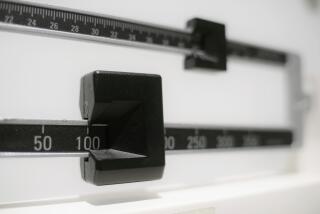Think a fast can give you license to feast?
- Share via
Many of us prepare for the feast by declaring our own famine. In this, the season of holiday parties, family get-togethers, office shindigs, we are, inevitably, going to eat and drink too much. So we get ready.
There are those who fast for a day or two now and then, or cut out breakfast and lunch on the day of the big meal. Some declare Monday to be yogurt day.
Or maybe it’s time for the popcorn diet while waiting for the next day’s mounds of food.
But do these deprivation strategies, often intended to limit calorie consumption and weight gain, actually work? Is it possible to go from one extreme to the other and somehow strike a happy medium?
Fat chance, nutritionists say.
(And if you tried it last week for the first time this season, what follows will serve more as an explanation than a cautionary story.)
Skipping breakfast, lunch or both on feast day may actually increase the amount of calories we consume. In several experiments, researchers have shown that people who skimp on lunch or breafast tend to make up for the lost calories by eating more than usual at the next meal.
When we fast, psychologists say, we’re doing more than just making ourselves hungry; we may also, subconsiously, be giving ourselves license to splurge when the big meal finally arrives.
This kind of thinking is similar to what psychiatrists see in people with eating disorders -- extreme denial, followed by a reward: binging. It’s quite possible to eat more calories during one huge meal than you would in three normal ones. Susan Bowerman, of the UCLA Center for Human Nutrition, says that people who regularly watch their calories are especially vulnerable.
If you’re trying to stick to, say, 1,800 calories a day, you could very quickly climb to 2,500 or more before your body senses it, she says. It takes the stomach about 20 minutes to signal the brain that it’s full, during which time a lot of stuffing can go down the hatch. And the penalty for the gorging is more than just extra calories. Metabolism slows when we deprive ourselves; a sudden onslaught of food diverts blood to the digestive system, often leaving us lightheaded and slightly nauseated. “At that point,” says Bowerman, “you just want someone to roll you onto the couch.”
If that sounds familiar, so might this: We often drink more than usual during the holidays, and the effects of excessive alcohol consumption are exaggerated by fasting. Drink on an empty stomach and the alcohol rushes through the blood-brain barrier, and you may be swaying in the breeze a lot quicker. The sensible approach, says Amy Hendel, an Encino nutrition consultant, is to “bank” calories, not by fasting or any other extreme form of deprivation, but by simply eating smaller meals on days when it’s possible.






